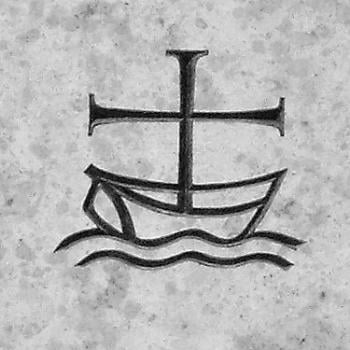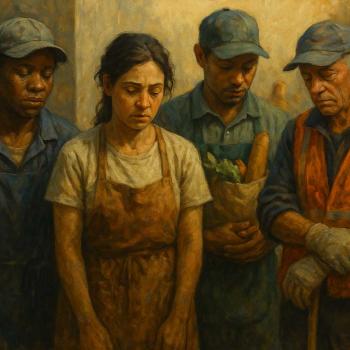When I found this statement in 1996, I realized I was not alone in my experiential understanding of belief, uncommon though it was. I was tired of what seemed to be an entire religious tradition that had an abstract and verbal relationship with God (i.e., the Catholicism and other forms of Christianity that I'd grown up with in my family). I was weary of the theology that said that the one-and-only "God" was transcendent and unknowable, and yet still had a great deal to say about what that supposedly unknowable god was, did, said, and preferred. It all seemed awfully "idolatrous" to me in terms of Weil's construction. Polytheism, on the other hand, offered an immanent experience of deities, and polytheist theology did not define deity in the "omni-" terms that are assumed of "any God worth its salt" in the Christian and Islamic religions.
When I was getting my religious studies M.A. in 1999, I encountered a similarly different understanding of "faith" and "belief" in a class taught by Leonard Doohan, a lay Catholic theologian at Gonzaga University. In our Ecclesiology course, he defined "faith" as one's experience of the Divine, and "belief" as an articulation of that experience. (A systematization of such articulations is called a "religion.") This is the definition of all of these terms that I have since preferred—with the caveat, of course, that "the Divine" be understood to include non-monotheistic or non-monistic divine realities, like the polytheistic universe of deities and other divine beings. These definitions are not commonly known nor accepted, however, either amongst Catholics or the wider Christian and non-Christian worlds. This is a pity, because they fit the experiential nature of many other non-Christian religions quite well.
A few months ago, in the alumni newsletter from Gonzaga University, Latin professor Fr. Ken Krall had a very good article about how many Latin words have a greater range of meaning than single English words do (as we saw above with the tiny word in!). One such complex word is credere, the verb "to believe," which is the basis for the English noun "creed" and adjective "creedal." While it is most often translated as "to believe," it can also equally well be translated "to trust." Knowing that, and knowing my preferred understanding of "believe in," imagine what is written on every piece of money in the U.S. In doing so, one can get a potentially liberating view of the phrase "In God We Trust"!
But, think further about "In God We Trust" for a moment. One doesn't "trust" in things that one can't be reasonably certain exist. No one does trust-fall exercises with people who they aren't certain will catch them. One does not loan money to people one doesn't trust, nor leave one's possessions in their care, nor trust them to look after one's children. Trust depends on much more than putting "good faith" in a person and assuming they'll do the right thing. When trust is broken or its expectations are not met, it is lost, generally quickly, and often permanently. How, then, can one trust in the existence of deities without some indication that they exist?
When the question of "belief" comes up in modern Pagan and polytheist contexts, I get very annoyed that the definition being used comes from the creedal religious majority in the U.S., and not from a more experiential understanding as developed by Weil, Doohan, Krall, and others. When belief is understood in creedal terms within modern polytheism and Paganism, I have to say over and over again, "I don't believe in Antinous, I know him, and thus there's no need for belief any longer." Or, as Joseph Campbell said to Bill Moyers in The Power of Myth interviews, "I don't have to have faith—I have experience." But in an experiential understanding of "belief," built upon an experiential "faith" as advocated by Doohan, I have no end of beliefs in Antinous!
There is absolutely no reason to "believe" in the gods of polytheism outside of experience of them. To "have faith" in the context I'm describing is not to assume something is true when it isn't. When something can't be objectively proven, faith is based on having (or further seeking) direct experiences with the gods of one's choice (or, as often as not, the gods themselves choose how and to whom they make themselves known!).
It does not matter that these experiences can't be confirmed objectively (outside of brain scans that demonstrate parts of the brain associated with "religious experiences" are being stimulated). Almost all experiences of value to humans—including love, enjoyment, tragedy, awe, anger, and any number of others—are primarily perceptual in their reality, and cannot ever be adequately conveyed to another person. Science is great for understanding things objectively, and for determining what is and is not factual. But religion is, in my view, one of the best contexts for exploring subjective experiences like love, enjoyment, tragedy, awe, and contact with things in the universe far larger and older than oneself; in other words, having the experiences of meaning and personal truth that form beliefs.
I disagree strongly with Halstead on deity-centered Paganism having a creedal basis. But I do think he was on to something in suggesting that "belief" (at least as understood experientially) supports a deity-centered Pagan between direct experiences of their deities. Despite working with different definitions of the terms than I'm using here, Halstead's theories about deity-centered Pagans are actually applicable in an experientially-based understanding.
Belief is a vexed and complex problem, as all matters of definition are in theology and religion. And yet, it is very important to establish a clearer understanding of belief if there is to be fruitful intrafaith or interfaith dialogue in modern Paganism and polytheism.





